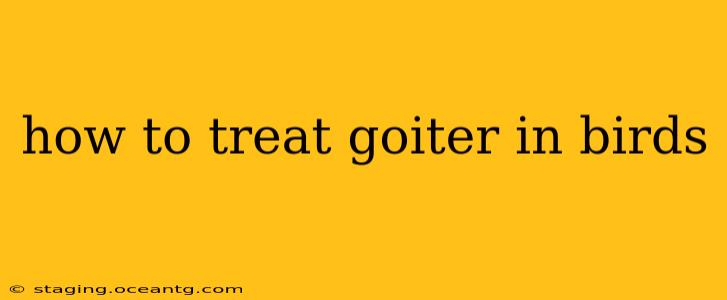Goiter in birds, a swelling of the throat area, is a concerning condition often stemming from dietary deficiencies or underlying health issues. This comprehensive guide explores the causes, symptoms, diagnosis, and treatment of goiter in avian companions, empowering bird owners to provide the best possible care.
What is Goiter in Birds?
Goiter refers to an enlargement of the thyroid gland located in the neck region. In birds, this manifests as a visible swelling, often described as a lump or bulge, at the base of the throat or under the feathers. While visually noticeable, the underlying cause requires careful veterinary assessment. It's crucial to understand that this condition isn't a single disease, but rather a symptom of an underlying problem.
What Causes Goiter in Birds?
Several factors contribute to goiter development. Understanding these causes is vital for effective treatment:
1. Iodine Deficiency: This is the most common cause. Iodine is essential for thyroid hormone production, and a deficiency can lead to the thyroid gland working harder and enlarging to compensate.
2. Nutritional Imbalances: A diet lacking essential vitamins and minerals, beyond just iodine, can disrupt thyroid function. This includes deficiencies in essential amino acids and other micronutrients.
3. Bacterial or Fungal Infections: Infections can sometimes impact the thyroid gland, causing inflammation and enlargement.
4. Tumors: In rare cases, goiter can be caused by benign or malignant tumors of the thyroid gland.
5. Genetic Predisposition: Some bird species or breeds might be genetically more susceptible to goiter.
How is Goiter Diagnosed in Birds?
Diagnosis involves a thorough examination by an avian veterinarian. The vet will:
- Conduct a Physical Exam: Examining the goiter's size, consistency, and location.
- Review the Bird's History: Inquiring about diet, symptoms, and overall health.
- Run Blood Tests: Assessing thyroid hormone levels and checking for other underlying issues.
- Radiography (X-rays): Imaging the thyroid area to determine the size and structure of the goiter and rule out other conditions.
How is Goiter Treated in Birds?
Treatment depends on the underlying cause, identified through the diagnostic process. There is no one-size-fits-all solution. Common approaches include:
-
Dietary Adjustments: Supplementing the bird's diet with iodine (under strict veterinary guidance) is often crucial. This might involve switching to a high-quality commercial bird food formulated to address iodine deficiencies or adding specific supplements. It's vital to never self-medicate your bird.
-
Medication: In cases of bacterial or fungal infections, the vet may prescribe appropriate antibiotics or antifungals. Medication may also be used to address other underlying health problems.
-
Surgery: In rare instances, particularly if a tumor is present or the goiter is excessively large and causing respiratory distress, surgery might be considered. This is a complex procedure requiring specialized avian surgical expertise.
What are the Symptoms of Goiter in Birds?
Recognizing the symptoms early is crucial for effective treatment. Common signs include:
- Visible Swelling: A noticeable lump or bulge in the throat area.
- Difficulty Swallowing: The bird may struggle to eat or drink.
- Respiratory Distress: Breathing difficulties due to pressure on the trachea.
- Lethargy and Weakness: A general decline in energy and activity levels.
- Weight Loss: Significant decrease in body weight despite adequate food intake.
- Changes in Feathering: Ruffled or dull feathers.
Can Goiter in Birds Be Prevented?
While not all cases are preventable, minimizing the risk involves:
- Providing a Balanced Diet: Ensure your bird receives a diet rich in iodine and other essential nutrients.
- High-Quality Bird Food: Choose commercial bird food from reputable brands that meet the nutritional needs of your specific species.
- Regular Veterinary Checkups: Regular checkups allow for early detection of health problems.
What if I Suspect My Bird Has Goiter?
Immediate veterinary attention is crucial. Delaying treatment can lead to serious complications. A qualified avian veterinarian is best equipped to diagnose and manage this condition. They will develop a tailored treatment plan based on your bird's specific situation. Don't hesitate to seek professional help if you notice any signs of goiter. Early intervention significantly improves the prognosis.
Disclaimer: This information is for educational purposes only and should not be considered veterinary advice. Always consult a qualified avian veterinarian for any health concerns regarding your bird.
